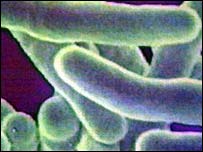Entered into the database on Friday, October 07th, 2005 @ 19:03:36 MST
A virulent form of tuberculosis was created in the laboratory by experts
trying to alter its genetic structure. The mutant form of the bug multiplied more quickly, and was more lethal than its
natural counterpart. Researchers from the University of California at Berkeley, US, had actually
been trying to disable genes and make the bacterium less deadly. "This is one of the very few hyper-virulent organisms ever created,"
said scientist Dr Lisa Morici. Tuberculosis is one of the world's biggest killers, and scientists are probing
its genetic structure in a bid to find weaknesses that might be exploited by
new treatments. The Berkeley study, published in the Proceedings of the National Academy of
Sciences, concentrated on a particular collection of genes thought to give TB
some of its virulence - its ability to infect. Growing threat They disabled these genes, and expected to find a weakened form of TB as a
result. Instead, the organism grew in virulence. It killed laboratory mice within seven months of exposure, while those infected
with normal TB survived the experiment. Further investigations suggested that the genetic changes had the unexpected
effect of undermining the body's own immune response against TB. Professor Lee Riley, who led the study, said: "These findings came as
a complete surprise to us. "We thought we had made a mistake, so we repeated the test several times,
and we always got the same result." Bioterror played down There have been fears that similar genetic modifications might lead to a new
form of TB that could be used in bioterrorism, but Dr Morici said this was unlikely.
The bacterium is hard to deliver in an aerosol - the accepted method of spreading
it over large populations - and despite its extra virulence in the lab, still
grows relatively slowly and can be treated by antibiotics. "There are several other organisms out there that are easier to manipulate
than TB," she said. Dr Neil Stoker, from the Royal Veterinary College at the University of London,
UK, said that his research had also uncovered hyper-virulent strains of TB.
The emergence of these strains should pose no risk to humans, he said. "These are not going to become 'super-strains'," he said. "They
are already going to be out there, and they have not become dominant."
TB is such a "successful" pathogen, he said, for completely the opposite
reason. "It is such a phenomenal pathogen because it does not cause disease in
everyone it infects. "It has this extraordinary ability to transmit itself, and nine out of
10 people who have it will never fall ill."
